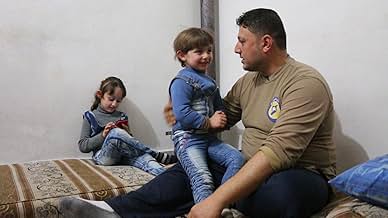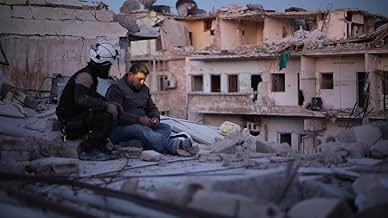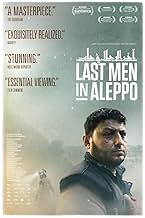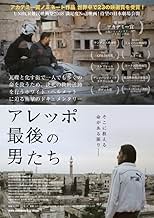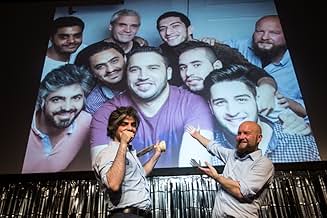CALIFICACIÓN DE IMDb
7.4/10
3.1 k
TU CALIFICACIÓN
Agrega una trama en tu idiomaKhaled, Mahmoud and Subhi volunteer with the White Helmets trying to save lives of hundreds of victims in the besieged city of Aleppo during the Syrian Civil War.Khaled, Mahmoud and Subhi volunteer with the White Helmets trying to save lives of hundreds of victims in the besieged city of Aleppo during the Syrian Civil War.Khaled, Mahmoud and Subhi volunteer with the White Helmets trying to save lives of hundreds of victims in the besieged city of Aleppo during the Syrian Civil War.
- Dirección
- Guionista
- Elenco
- Nominado a 1 premio Óscar
- 26 premios ganados y 17 nominaciones en total
Mahmoud Alheter
- Self - volunteer rescue worker
- (as Mahmoud)
- Dirección
- Guionista
- Todo el elenco y el equipo
- Producción, taquilla y más en IMDbPro
Opiniones destacadas
Full review on my blog max4movies: De sidste mænd i Aleppo (international title: Last Men in Aleppo) is a documentary about the White Helmets, a voluntary nonprofessional organization in Syria that has been helping people after bomb attacks since the civil war started in 2013. The documentary features footage that was shot between 2013 and 2017 and mostly focuses on three young men and their dilemma whether to stay or leave Aleppo. There is few information provided and no additional material was used (like interviews or external media coverage), which is why the documentary feels authentic but also raw. The conflict in Syria is a contemporary geopolitical crisis and, thus, the documentary is topical, important, and although few scenes actually contain graphic violence or gore, the catastrophe feels personal and heart-breaking. Although there are some technical drawbacks (e.g., structure and editing), the subject matter is simply too important to disregard.
"There is nothing intelligent to say about a massacre. Everybody is supposed to be dead, to never say anything or want anything ever again. Everything is supposed to be very quiet after a massacre, and it always is, except for the birds. And what do the birds say? All there is to say about a massacre, things like 'Poo-tee-weet?'" Kurt Vonnegut, Slaughterhouse-Five
Call it what you will, Syria's President Assad's pummeling his people with the aid of Russian bombers is genocide plain and simple. You do not want to see the blunt documentary Last Men in Aleppo if you support Assad or can't stomach The White Helmets pulling dead babies from rubble.
What you will see, however, is a first-rate rendering from the streets of Helmet heroic citizens risking their lives to save the victims of the destruction. The doc concentrates on Khaled Omar, a founder of the Helmets, looking for people to save all the time staying in contact through cell with his family. On occasion he plays with the kids at an oasis of a playground.
Therein lies the supreme irony of people trying to survive holocaust and trying to retain the dignities of normal life. As one Helmet says, "Should we sit down and cry or what?" Actually only the words of the survivors can get even close to understanding genocide in our own time, 250,000 Syrians dead since the purge began in 2011.
Although Khaled and his crew save adults as well, the children are the starkest notion of cruelty on a mass basis and the loss of future for everyone, as Khaled says profoundly and prophetically, "The dilemma is the children." Despite the discursive narration and exposition that seem to randomly course among the ruins, the cumulative effect of sorrow and brief joy is to give us an unforgettable documentary experience, even if we go back to our democratic safety zones, creating a few potholes on an airstrip while the city burns.
"The horror! The horror!" Joseph Conrad's Kurtz in Heart of Darkness
Call it what you will, Syria's President Assad's pummeling his people with the aid of Russian bombers is genocide plain and simple. You do not want to see the blunt documentary Last Men in Aleppo if you support Assad or can't stomach The White Helmets pulling dead babies from rubble.
What you will see, however, is a first-rate rendering from the streets of Helmet heroic citizens risking their lives to save the victims of the destruction. The doc concentrates on Khaled Omar, a founder of the Helmets, looking for people to save all the time staying in contact through cell with his family. On occasion he plays with the kids at an oasis of a playground.
Therein lies the supreme irony of people trying to survive holocaust and trying to retain the dignities of normal life. As one Helmet says, "Should we sit down and cry or what?" Actually only the words of the survivors can get even close to understanding genocide in our own time, 250,000 Syrians dead since the purge began in 2011.
Although Khaled and his crew save adults as well, the children are the starkest notion of cruelty on a mass basis and the loss of future for everyone, as Khaled says profoundly and prophetically, "The dilemma is the children." Despite the discursive narration and exposition that seem to randomly course among the ruins, the cumulative effect of sorrow and brief joy is to give us an unforgettable documentary experience, even if we go back to our democratic safety zones, creating a few potholes on an airstrip while the city burns.
"The horror! The horror!" Joseph Conrad's Kurtz in Heart of Darkness
Ooff....I can't even.
How do you review a movie like "Last Men in Aleppo?" It's about as opposite from entertaining as you're likely to get, yet it should be watched by everybody. It's incredibly urgent, yet it's so lacking in hope that it seems naive to think it will inspire any kind of action or change. It's basically an obituary for a country that hasn't completely died yet, but is certainly dying. And doing so while the world stands back and watches.
Last year, the film that won the Academy Award for Best Documentary Short Subject was about a member of the White Helmets, a volunteer emergency response group in Syria. He enjoyed 15 minutes of fame when footage of him pulling a living baby from rubble circulated the Internet. That man is now the focus of "Last Men in Aleppo," a film that chronicles his life and eventual death as a member of the White Helmets. Whereas "The White Helmets," in that image of a rescued baby, offered some ounce of hope to cling to, "Last Men in Aleppo" offers nothing but despair. It's the kind of movie that makes it difficult to go about your daily life. The mundane minutiae of being a privileged American -- my biggest annoyance right now is that the motion-sensor light on my garage needs to be replaced -- make me almost embarrassed to enjoy a life of extreme luxury compared to the living conditions of these poor poor people in Syria. That the developed world stood back and watched this conflict happen with a shrug of its collective shoulders will go down in history as one of its most shameful moments.
Grade: A
How do you review a movie like "Last Men in Aleppo?" It's about as opposite from entertaining as you're likely to get, yet it should be watched by everybody. It's incredibly urgent, yet it's so lacking in hope that it seems naive to think it will inspire any kind of action or change. It's basically an obituary for a country that hasn't completely died yet, but is certainly dying. And doing so while the world stands back and watches.
Last year, the film that won the Academy Award for Best Documentary Short Subject was about a member of the White Helmets, a volunteer emergency response group in Syria. He enjoyed 15 minutes of fame when footage of him pulling a living baby from rubble circulated the Internet. That man is now the focus of "Last Men in Aleppo," a film that chronicles his life and eventual death as a member of the White Helmets. Whereas "The White Helmets," in that image of a rescued baby, offered some ounce of hope to cling to, "Last Men in Aleppo" offers nothing but despair. It's the kind of movie that makes it difficult to go about your daily life. The mundane minutiae of being a privileged American -- my biggest annoyance right now is that the motion-sensor light on my garage needs to be replaced -- make me almost embarrassed to enjoy a life of extreme luxury compared to the living conditions of these poor poor people in Syria. That the developed world stood back and watched this conflict happen with a shrug of its collective shoulders will go down in history as one of its most shameful moments.
Grade: A
I felt really bad after watching this documentary... but I suppose that's the whole point of it - to try and awake our sense of humanity and react politically against these atrocities committed against innocent civilians. I hope our politicians in the West are watching this, but I fear they will not do anything to protect these victims of genocide. The documentary shows the brutal reality of what happened and is still happening in Syria.
"Last Men in Aleppo", is a shattering Danish/Syrian documentary about the Syrian Civil War that should leave you in anger and tears after viewing it.
Beginning as a film editor, Syrian writer/director Firas Fayvad previously had made documentaries for television, his most famous being "On the Other Side", the making of which resulted in Fayyad's arrest and torture for nine months between 2011 and 2012. But even that has not achieved the level of international fame "Last Men in Aleppo" has brought him, for it documents the efforts of the White Helmets, an organization consisting of ordinary citizens whose purpose is to save civilians (especially children) who are buried under the rubble from continuous bombings by the Soviet Union unabashedly targeting apartment buildings, hospitals and non-military establishments.
What is so shocking about this film is the way it plants the viewer in the middle of the violence as it is happening, and from the point of view of the heroic rescuers. There are deliberate lulls in the film in which we live in the houses with the families of the White Helmets, but that just makes the inhuman tragedy even more shocking when the violence comes. This is a film impossible to forget once seen.
Beginning as a film editor, Syrian writer/director Firas Fayvad previously had made documentaries for television, his most famous being "On the Other Side", the making of which resulted in Fayyad's arrest and torture for nine months between 2011 and 2012. But even that has not achieved the level of international fame "Last Men in Aleppo" has brought him, for it documents the efforts of the White Helmets, an organization consisting of ordinary citizens whose purpose is to save civilians (especially children) who are buried under the rubble from continuous bombings by the Soviet Union unabashedly targeting apartment buildings, hospitals and non-military establishments.
What is so shocking about this film is the way it plants the viewer in the middle of the violence as it is happening, and from the point of view of the heroic rescuers. There are deliberate lulls in the film in which we live in the houses with the families of the White Helmets, but that just makes the inhuman tragedy even more shocking when the violence comes. This is a film impossible to forget once seen.
¿Sabías que…?
- TriviaTodas las entradas contienen spoilers
- ConexionesFeatured in Los 90 Premios de la Academia (2018)
Selecciones populares
Inicia sesión para calificar y agrega a la lista de videos para obtener recomendaciones personalizadas
Detalles
- Fecha de lanzamiento
- Países de origen
- Sitio oficial
- Idioma
- También se conoce como
- 阿勒坡最後的男人
- Locaciones de filmación
- Aleppo, Syria(location)
- Productoras
- Ver más créditos de la compañía en IMDbPro
Taquilla
- Total en EE. UU. y Canadá
- USD 14,637
- Fin de semana de estreno en EE. UU. y Canadá
- USD 1,505
- 7 may 2017
- Total a nivel mundial
- USD 14,637
Contribuir a esta página
Sugiere una edición o agrega el contenido que falta

Principales brechas de datos
By what name was Last Men in Aleppo (2017) officially released in Canada in English?
Responda

